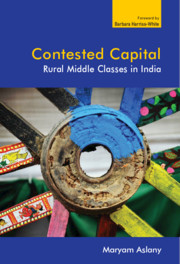Book contents
- Frontmatter
- Dedication
- Contents
- List of Figures and Maps
- List of Tables
- List of Abbreviations
- Foreword
- Acknowledgments
- Introduction: The Problem of the ‘Rural Middle Class(es)’
- 1 Trajectory of the Indian Middle Class: Its Size and Geographical Variations
- 2 In Search of the Rural Middle Classes: From Village Stratification to Rural Household Variations
- 3 Marx: Capital, Labour and the Rural Middle Classes
- 4 Weber: Marketable Capital, Status and the Rural Middle Classes
- 5 Bourdieu: Cultural Capital, Self-perception and the Middle-class Identity in Rural India
- Conclusion: Understanding the Rural Middle Classes
- Appendix A1 Non-farm Occupations in Rahatwade and Nandur
- Appendix A2 Caste and Occupations: The Urban Middle-Class Labour Market
- Appendix A3 Caste and Occupations in Rural India since 1991
- Appendix A4 Caste and Income Distribution
- Appendix A5 Caste and Socio-economic Indicators in Rural and Urban India
- Appendix A6 Caste Composition of Urban Middle Classes in India
- Appendix A7 Caste Composition of the Rural Middle Classes in Maharashtra
- Appendix A8 Household Survey Questionnaire 1
- Appendix A9 Household Socio-economic Survey Questionnaire 2
- References
- Index
Foreword
Published online by Cambridge University Press: 13 May 2020
- Frontmatter
- Dedication
- Contents
- List of Figures and Maps
- List of Tables
- List of Abbreviations
- Foreword
- Acknowledgments
- Introduction: The Problem of the ‘Rural Middle Class(es)’
- 1 Trajectory of the Indian Middle Class: Its Size and Geographical Variations
- 2 In Search of the Rural Middle Classes: From Village Stratification to Rural Household Variations
- 3 Marx: Capital, Labour and the Rural Middle Classes
- 4 Weber: Marketable Capital, Status and the Rural Middle Classes
- 5 Bourdieu: Cultural Capital, Self-perception and the Middle-class Identity in Rural India
- Conclusion: Understanding the Rural Middle Classes
- Appendix A1 Non-farm Occupations in Rahatwade and Nandur
- Appendix A2 Caste and Occupations: The Urban Middle-Class Labour Market
- Appendix A3 Caste and Occupations in Rural India since 1991
- Appendix A4 Caste and Income Distribution
- Appendix A5 Caste and Socio-economic Indicators in Rural and Urban India
- Appendix A6 Caste Composition of Urban Middle Classes in India
- Appendix A7 Caste Composition of the Rural Middle Classes in Maharashtra
- Appendix A8 Household Survey Questionnaire 1
- Appendix A9 Household Socio-economic Survey Questionnaire 2
- References
- Index
Summary
While the term ‘middle class’ has been in currency for almost 300 years, its definition – and thus its size – has always been bathed in vagueness, ambiguity and controversy. Just as the concept of class itself has been the subject of a series of mutually incompatible theories, the question of what might constitute the middle of an economic distribution or a social hierarchy has until now never been resolved by the sizeable industry devoted to it, other than in arbitrary ways. The peculiarities of the statistical evidence that might clarify the concept have made identifying middle classes, let alone comparing them, very difficult. And people have their own views about their class positions: their self-identifications can challenge those of the researcher.
In spite of these difficulties, the importance of what the concept denotes is indisputable, and has several equally indisputable dimensions. One dimension of ‘middle-class-ness’ involves culture – expressed in particular kinds of housing, social networks, leisure pursuits, style, and aspirations. The hope of upward mobility within the middle class focusses the longing to enjoy a swathe of services, notably health and education, to achieve competences and forms of security, and – in the view of many commentators – to develop and protect an illiberal politics of techno-authoritarian management.
Middle class culture also calls for a certain level of discretionary income – though the range of incomes considered to denote ‘middle-class-ness’ by scholars varies greatly. For India alone in the last decade this range has varied between an annual household income of US$ 4,300 in rupee equivalents, to one of US$ 27,000. Middle-class-ness may also be measured as the median expenditure group in a distribution of household expenditure; or identified by occupations – though here too there is a huge and debated range of occupations considered by analysts to be middle class.
Aspirational goods and services give rise to a politics of provision and consumption, of acquisition and defence of the status goods expressing discretionary income. The provision of such goods entails vast investments in the massification of formerly luxury commodities and services, and in the privatisation of facilities, places and spaces.
- Type
- Chapter
- Information
- Contested CapitalRural Middle Classes in India, pp. xvii - xxPublisher: Cambridge University PressPrint publication year: 2020



